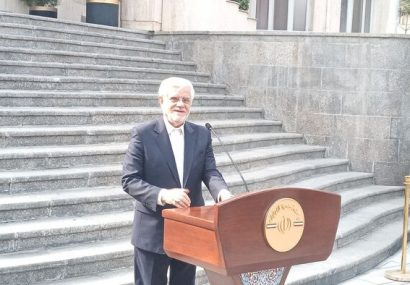Vice President Rules Out Talks with Trump, Prioritizes Economic Stability TEHRAN (Iran News) TEHRAN – First Vice President, Mohammad Reza Aref, has stated that while no meeting between two individuals is entirely impossible, holding talks with former U.S. President Donald Trump is not on the agenda of the Islamic Republic. During a press briefing following a […]
Vice President Rules Out Talks with Trump, Prioritizes Economic Stability
TEHRAN (Iran News) TEHRAN – First Vice President, Mohammad Reza Aref, has stated that while no meeting between two individuals is entirely impossible, holding talks with former U.S. President Donald Trump is not on the agenda of the Islamic Republic.
During a press briefing following a government cabinet meeting on Wednesday, Aref responded to Trump’s recent remarks about potential negotiations with the Iranian president. He emphasized that Iran’s strategic policies, particularly in defense, have always been clear, stable, and long-term.
Aref reaffirmed Iran’s commitment to its religious decree (fatwa) against nuclear weapons. “If Trump believes that Iran should not pursue nuclear weapons, he can rest assured, as our policy on this matter is permanent. We have a clear strategy, and our stance on this issue has not changed,” he asserted.
He also referenced a government exhibition showcasing achievements of the Ministry of Defense and Armed Forces Support, highlighting Iran’s progress in scientific self-sufficiency and food security. “The exhibition displayed valuable advancements in industrial sectors, artificial intelligence, and the oil industry, as well as significant progress in food security and agriculture,” he noted.
Aref acknowledged Iran’s reliance on imported essential goods, particularly cooking oil, but stressed that efforts are underway to achieve self-sufficiency. “We hope to expand these efforts beyond oil to other sectors and ultimately reach self-sufficiency in agriculture,” he stated.
He further emphasized Iran’s commitment to self-reliance in defense, declaring, “We are not a nation that seeks war, but we will firmly defend ourselves and procure the necessary equipment. We also believe that peaceful nuclear technology should be accessible to all nations for maximum benefit.”
Regarding Iran’s economic situation, Aref reaffirmed the government’s commitment to structural and economic reforms. “Our top priority is the livelihood of the people,” he said, explaining that the government is implementing a five-pillar economic plan aimed at improving living conditions.
He acknowledged short-term economic hardships but assured that the government is implementing support packages, particularly for vulnerable groups. “Market regulation is a key focus, and committees within relevant agencies are actively monitoring inflation. We have already seen a significant decline in inflation rates, and we aim to achieve sustainable economic growth,” he added.
Addressing concerns over Iran’s currency exchange policy, Aref highlighted the government’s goal of stabilizing the exchange rate by adopting a single-rate currency system. “The integration of different exchange rates into a single market will help balance supply and demand. Although there have been fluctuations, we believe that stabilizing the market will resolve existing challenges,” he explained.
He also acknowledged public concerns regarding the slow implementation of policies, expressing hope that collaboration between the Ministry of Industry and the Central Bank would resolve currency-related issues and ensure businesses receive the necessary foreign exchange resources.
Aref outlined the government’s foreign policy approach, emphasizing enhanced trade relations. “Our primary focus is strengthening ties with neighboring and regional countries, followed by Islamic nations and other interested countries. Africa is also a priority,” he stated.
He highlighted Iran’s active participation in regional economic unions, including its recent observer status in the Eurasian Economic Union (EAEU). “We have signed a free trade agreement with EAEU members, which has been ratified by the Iranian parliament. Although some legal amendments are required, this agreement will significantly boost trade and cooperation,” he explained.
Aref also noted Iran’s efforts to develop major trade corridors, including the North-South and East-West routes, with infrastructure projects such as the Basra-Shalamcheh and Chabahar-Zahedan railway lines expected to enhance trade relations.
Addressing speculation about the role of former national security official Ali Shamkhani in nuclear negotiations, Aref clarified that Iran’s foreign ministry is solely responsible for handling nuclear talks. “Decisions on major foreign policy matters are made by the Supreme National Security Council and require the Supreme Leader’s approval. The foreign ministry leads negotiations, with contributions from experts in relevant committees,” he stated.
Aref also addressed Iran’s privatization efforts, emphasizing that it is a key government policy and a legal obligation. However, he stressed the importance of ensuring privatization is conducted under proper conditions, including job security and industrial growth. “The government remains committed to privatization, including in major industries such as Iran Khodro, but the process must be carefully managed to protect employment and production,” he said.
In response to questions about alleged dual citizenship concerns within the administration, Aref dismissed the claims as inappropriate, especially during the anniversary of the Islamic Revolution. “Everyone, including government officials, must adhere to the law. Any legal concerns should be addressed through proper channels, rather than being used for political maneuvering,” he stated.
Iran’s Vice President reiterated the government’s focus on economic stability, self-sufficiency, and regional cooperation. He ruled out negotiations with Trump, reaffirmed Iran’s anti-nuclear stance, and outlined policies aimed at economic growth, market regulation, and currency stabilization. Additionally, he emphasized the importance of trade partnerships, infrastructure development, and privatization while clarifying the role of the foreign ministry in nuclear negotiations.
- source : IRAN NEWS NATIONAL DESK






























